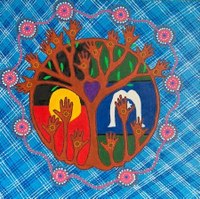Anton Breinl Research Centre Aboriginal and Torres Strait Islander health WOmen’s action for Mums and Bubs (WOMB)
WOmen’s action for Mums and Bubs (WOMB)
- Future Students
- JCU Global Experience
- International Students
- Student experience
- Open Day
- How to apply
- Pathways to university
- Living on Campus
- Courses
- Publications
- Mature students
- Scholarships
- Entry options
- JCU Families
- JCU Heroes Programs
- Aboriginal and Torres Strait Islander in Marine Science
- Elite Athletes
- Defence
- AI@JCU
- AALL
- Current Students
- Student Ambassador Program
- New students
- JCU Orientation
- LearnJCU
- Placements
- EDQS
- Unicare Centre and Unicampus Kids
- Graduation
- Off-Campus Students
- JCU Job Ready
- Safety and Wellbeing
- JCU Prizes
- Professional Experience Placement
- Employability Edge
- Art of Academic Writing
- Art of Academic Editing
- Careers and Employability
- Student Equity and Wellbeing
- Career Ready Plan
- Careers at JCU
- Partners and Community
- Alumni
- International partnerships
- About JCU
- Reputation and Experience
- Chancellery
- Governance
- Celebrating 50 Years
- Academy
- Indigenous Engagement
- Education Division
- Graduate Research School
- Research Division
- Research and Innovation Services
- CASE
- College of Business, Law and Governance
- College of Healthcare Sciences
- College of Medicine and Dentistry
- College of Science and Engineering
- Anthropological Laboratory for Tropical Audiovisual Research (ALTAR)
- Anton Breinl Research Centre
- Agriculture Technology and Adoption Centre (AgTAC)
- Advanced Analytical Centre
- AMHHEC
- Aquaculture Solutions
- AMHRA
- JCU Digital Wellbeing Group
- ARCSTA
- Lions Marine Research Trust
- Australian Tropical Herbarium
- Australian Quantum & Classical Transport Physics Group
- Boating and Diving
- Clinical Psychedelic Research Lab
- Centre for Tropical Biosecurity
- Centre for Tropical Bioinformatics and Molecular Biology
- CITBA
- CMT
- Centre for Disaster Solutions
- CSTFA
- Cyclone Testing Station
- The Centre for Disaster Studies
- Daintree Rainforest Observatory
- Fletcherview
- JCU Eduquarium
- JCU Turtle Health Research
- MARF
- Orpheus
- TESS
- JCU Ideas Lab
- CNL
- TARL
- eResearch
- Indigenous Education and Research Centre
- Past Course and Subject Handbooks
- Estate
- Work Health and Safety
- Staff
- Discover Nature at JCU
- Cyber Security Hub
- Association of Australian University Secretaries
- Services and Resources Division
- Environmental Research Complex [ERC]
- Foundation for Australian Literary Studies
- Gender Equity at JCU
- Give to JCU
- Indigenous Legal Needs Project
- Inherent Requirements
- IsoTropics Lab
- IT Services
- JCU Webinars
- JCU Events
- JCU Motorsports
- JCU Sport
- Library
- Mabo Decision: 30 years on
- Marine Geophysics Laboratory
- Office of the Vice Chancellor and President
- Outstanding Alumni
- Policy
- PAHL
- Queensland Research Centre for Peripheral Vascular Disease
- Rapid Assessment Unit
- RDIM
- Researcher Development Portal
- Roderick Centre for Australian Literature and Creative Writing
- Contextual Science for Tropical Coastal Ecosystems
- State of the Tropics
- Strategic Procurement
- Student profiles
- SWIRLnet
- TREAD
- TropEco for Staff and Students
- TUDLab
- VAVS Home
- WHOCC for Vector-borne & NTDs
- Media
- Copyright and Terms of Use
- Australian Institute of Tropical Health & Medicine
- JCU Respect
- Pay review

Logo art by Selina Tonga, Carbal Medical Services
“We as women all belong to the one tree, hands reaching up in growth, branching out learning from each other, moving around the cycle of life we continue to learn, grow empowering the next generation of strong healthy women.”
This project aims to test the effectiveness of community women’s groups to improve the quality of maternal and child health care and outcomes.
Why is this study needed?
Although there have been improvements in Aboriginal and Torres Strait Islander maternal and child health, more can be done. Continuous Quality Improvement (CQI) processes are effective in improving quality of care provided by primary health care services in areas such as maternal and child health. However, there is still significant variation in the quality of care provided between individual services.
There is strong evidence internationally that shows community women’s groups can improve maternal and child outcomes through improved quality of care, women’s empowerment, and new learning. As we know, participation in Aboriginal and Torres Strait Islander community women’s groups have shown similar empowerment.
How we will do this study?
Working in partnership in Indigenous health is fundamental. The project is a partnership between Aboriginal and Torres Strait Islander Primary Health Care services, community women's groups, and experienced researchers. Together we will use the best evidence about community participation in co-design of health services. In this project, women’s groups with the help of a local facilitator will plan and carry out changes to improve maternal and child health in their communities. Maternal and child health service data and women's stories will be analysed throughout the project to see if there are any changes in outcomes for Aboriginal and Torres Strait Islander mums and their bubs, and how the changes might have come about.
Project Updates
Publications
Preston, R., S. Rannard, C. Felton-Busch, S. Larkins, K. Canuto, K. Carlisle, R. Evans, M. Redman-MacLaren, J. Taylor, N. N. Turner, L. Yeomans, E. Sanguineti, M. Passey and J. Farmer (2019). "How and why do participatory women’s groups (PWGs) improve the quality of maternal and child health (MCH) care? A systematic review protocol." BMJ Open 9(9): e030461.
Contacts
For more information, please email womb@jcu.edu.au or contact:
Associate Professor Catrina Felton-Busch,
Co-Lead Investigator, James Cook University
07 4781 6491 catrina.feltonbusch@jcu.edu.au
Professor Sarah Larkins,
Co-Lead Investigator, James Cook University
07 4781 3139 sarah.larkins@jcu.edu.au